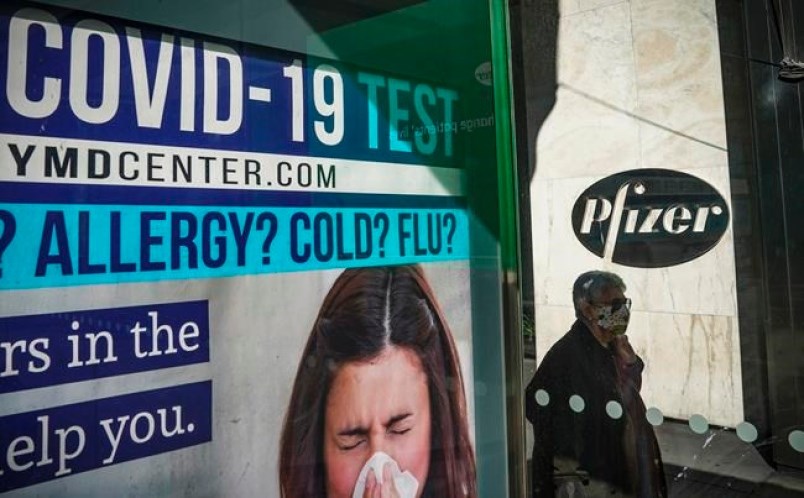Prime Minister Justin Trudeau said Canada is poised to receive more doses of COVID-19 vaccine per capita than any other country in the world.
The statement, made in a press conference Tuesday, came after political rivals accused the Liberal government of moving too slowly on vaccine procurement and putting too much faith in what was ultimately a failed partnership between the National Research Council and a Chinese company to develop a made-in-Canada vaccine.
“Canada now has the most diverse portfolio of any country for vaccines,” Trudeau said. “Canada was among the first to pre-order their vaccine doses. We are guaranteed some of Moderna’s first batch if the vaccine is safe and approved.”
Last week, Trudeau indicated other countries with domestic vaccine production are likely to inoculate their citizens first before shipping doses to Canada. But on Sunday, the chairman of American vaccine maker Moderna told the CBC that Canada is near the front of the line to receive 20 million doses of the COVID-19 vaccine it pre-ordered.
Noubar Afeyan was asked on CBC’s Rosemary Barton Live whether the fact that Canada committed to pre-purchase its doses before other jurisdictions means it will get its supply first.
Afeyan confirmed that was the case.
“The people who are willing to move early on with even less proof of the efficacy have assured the amount of supply they were willing to sign up to,” he said.
As of Dec. 1, four vaccine candidates had submitted applications to Health Canada for emergency review: Moderna, Pfizer and BioNtech, AstraZeneca, and on Monday, Johnson & Johnson.
Last week, Health Canada's chief medical adviser Dr. Supriya Sharma said the agency’s Pfizer review process has advanced furthest along the road to approval, with a final decision likely made at around the same time as the US Food and Drug Administration and the European Medicines Agency.
The FDA is to meet Dec. 10 to decide on approving the Pfizer vaccine.
Sharma was less definitive about when Canadians will start getting vaccinated. She said it is possible the first doses could arrive before the end of December but seemed to think it more realistic for them to start shipping here in January.
Canada has a purchase deal to buy at least 20 million doses from Pfizer and the option to buy another 56 million. The first four million are supposed to arrive between January and March.
On Tuesday, Minister of Public Services and Procurement Anita Anand left open an even wider delivery window, telling reporters she expected first doses of vaccine to be available in Canada within the first three months of 2021.
Canada has spent more than $1 billion to secure up to 414 million doses of candidate vaccine from seven suppliers, according to Anand. Another $284.2 million has been spent at the federal level to bolster the capacity to distribute vaccines.
Describing Health Canada’s approval process as the “gold standard,” Anand said it is “proceeding well.” In the meantime, she said the federal government has purchased 126 cold and ultra-cold storage freezers to store “the most promising vaccine candidates — namely Pfizer and Moderna.”
Early data on the Pfizer and Moderna vaccine candidates show they are both roughly 95% effective. However, both need to be kept at low temperatures to survive the gap between when they are manufactured and when they are administered to a patient.
Moderna’s vaccine requires refrigeration at minus 20 degrees Celsius, whereas the Pfizer vaccine requires a chilly minus 70, colder than the average winter temperature in Antarctica. Together with Canada’s existing capacity, Anand said the country can now store 33.5 million vaccine doses under cold and ultra-cold conditions.
Once the vaccines arrive, the other side of storage is distribution. Last Friday, Trudeau tapped former NATO commander Maj.-Gen. Dany Fortin to lead the national distribution effort, and Anand said the federal government anticipates having distribution contracts in place over the coming days.
The path to vaccination comes as Dr. Theresa Tam said Canada is registering 5,800 average daily cases for the last week, with British Columbia having overtaken Ontario and Quebec in per capita infection rates.
Who will get access to vaccines first will ultimately be decided by provincial health authorities, according to Health Minister Patty Hajdu.
As federal authorities negotiate the “delicate dance” to ensure the vaccine is both safe and arrives quickly, Hajdu said the federal and provincial governments are expected to coordinate who gets inoculated first based on the principals of “saving lives and stopping spread.”
At the provincial level, most provinces are in the process of developing their own vaccination strategies.
In Alberta, the province's top medical official has said she expects to receive 680,000 doses of COVID-19 vaccine early in the new year, a figure not yet confirmed by the federal government.
In British Columbia, provincial health officer Dr. Bonnie Henry said last week she expects B.C. could start receiving shipments of vaccine as early as January. Henry said a vaccine strategy is already in the works for the province, with front-line workers and those in long-term care homes — where 74% of COVID-19 deaths have occurred in Canada — at the front of the vaccination line.
"It's very much focused on who is most at risk and how do we protect them best," Henry said. "There's a lot of discussion that needs to happen."
Tam stressed Tuesday that each vaccine may end up being more effective for certain age groups or people with particular underlying conditions, adding that more data is needed on children and pregnant women because they weren’t included in early clinical trials.
“When we analyze all underlying medical conditions and the age, it still comes out that the age is in fact the most important when you look at severe illness and mortality,” she said. “[Age] is actually the easiest and most scientifically sound way of increasing the population coverage.”
— With files from the Canadian Press



